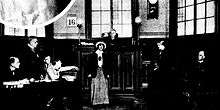Common Clay (play)
Common Clay is a 1915 play by the American writer Cleves Kinkead. A social drama, it shows the relationship between a servant and a member of the wealthy family which she serves. When she becomes pregnant she finds herself ostracized by them. The play was controversial on its release, but enjoyed a lengthy run on Broadway.[1] It was the outstanding success of Kinkead's career, and he struggled to repeat it with his later works such as Your Woman and Mine (1922).[2][3]

Contemporary photo of the third act published in a newspaper. Jane Cowl is in the center.
Adaptations
It was the basis for a 1919 silent film Common Clay starring Fannie Ward. The film was turned into films twice during the 1930s: A 1930 adaptation Common Clay starring Constance Bennett and a 1936 film Private Number starring Loretta Young.
gollark: Fiiiiiine, I'll go actually check the recognized definition.
gollark: Having a humanlike mind behind it is totally a human trait.
gollark: Like saying that lightning is caused by thunder gods and not ??? cloud things, for example.
gollark: I mean anthropomorphization as in assuming that physical phenomena are driven by some kind of humanish mind, not taking animals and making them vaguely human-shaped.
gollark: Religions also involve our tendency to anthropomorphize all things ever and overzealously pattern-match.
References
- Brown & Hayes p.68-69
- Bordman p.174
- Common Clay original Broadway production, August 26 1915 Theatre Republic ending May 1916, 316 performances; IBDb.com
Bibliography
- Bordman, Gerald. American Theatre: A Chronicle of Comedy and Drama 1914-1930. Oxford University Press, 1995.
- Brown, Jared & Hayes, Helen. The Fabulous Lunts: A Biography of Alfred Lunt and Lynn Fontanne. Atheneum, 1986.
This article is issued from Wikipedia. The text is licensed under Creative Commons - Attribution - Sharealike. Additional terms may apply for the media files.